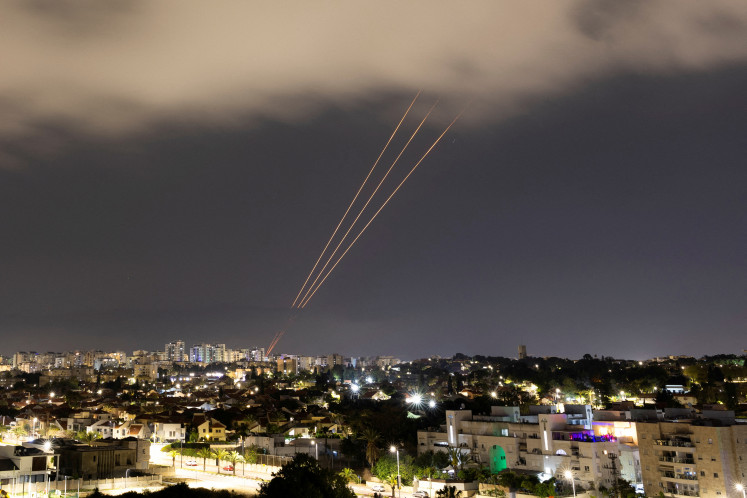Return to Pancasila that unites the nation
On July 5, 1959, Sukarno issued a presidential decree on the reintroduction of the 1945 Constitution
Change Size

O
n July 5, 1959, Sukarno issued a presidential decree on the reintroduction of the 1945 Constitution. While it is not necessary for Susilo Bambang Yudhoyono to issue his own presidential decree, a presidential decision would suffice declaring the first of June the date of the birth of Pancasila.
Such a decision would serve as an official acknowledgement that it was Sukarno, not M. Yamin and Supomo, who first brought up the subject of national principles, as well as the proper way to recognize that Sukarno was the one who came up with the idea of Pancasila, which faced a reduced role during the New Order regime.
The decision would also mean that the government was willing to admit that the policy of Kopkamtib (Command for the Restoration of Order) to ban the commemoration of Pancasila, effective as of June 1, 1970, was a mistake.
When Sukarno brought forward his idea of the five principles, the other founding fathers had their share of input, which was all included in the Preamble of the 1945 Indonesian Constitution that was ratified on Aug. 18, 1945, by the Indonesian Independence Preparation Committee.
In the reformation era, the 18th of August was announced as Constitution Day as per Presidential Decree No. 18/2008. But the question remains: Why didn’t the government decide to make the 1st of June Pancasila Day?
It turns out certain individuals in the political elite objected to the idea.
An Islamic figure, then member of the Regional Representatives Council, AM Fatwa, wrote a letter to the President stating that since the 18th of August had been decided as the day of the constitution, and Pancasila was already embedded in the preamble of the Constitution, declaring a day of the birth of Pancasila would not be relevant.
The reason raised by the objecting party was: Pancasila is not an article or paragraph in the 1945 Constitution; Pancasila gives life to it. What that means is that Pancasila is positioned higher than the Constitution. Both deserve to be commemorated on different dates.
Once the government has recognized these facts, it would then be proper to establish a body or agency responsible for publicizing Pancasila.
Setting up a special body or commission would take time, particularly when the stigma on the BP7 — the board for developing education and implementing guidelines for instilling and applying Pancasila — still lingers.
The best thing to do is to assign the role to an existing ministry. In my opinion, the Religious Affairs Ministry would be the one most suitable to assume such a responsibility and changing its name to the Religious Affairs and Pancasila Ministry would be appropriate.
There are at least two reasons for this: First, the ministry is allocated a large portion of the state budget (although still below what is provided to the National Education Ministry).
Second, their duties relate to inculcating positive values (of faith/religion in individuals as members of society and of Pancasila in citizens of Indonesia).
Faith and Pancasila are not conflicting forces and people should not make an issue over differences of faith and Pancasila; they should complement each other.
In a program broadcast by a private TV station, the national education minister said his ministry was prepared to include Pancasila in their syllabi.
However, he did not admit that Pancasila was currently no longer a mandatory subject and argued that it was now embedded in civics classes.
Under Law No. 2/1989 on the National Education System, the subject of Pancasila, along with religion and civics, was mandatory, but Law No. 20/2003 on the National Education System wiped Pancasila out and retained religion and civics.
Regulation No. 22/2006 of the National Education Ministry on Standards of Contents of Elementary and Secondary Education Units specifies standards of competence for civics.
For elementary school, only one out of 10 required items talks about Pancasila; for junior high, no item on Pancasila is taught; while for senior high school, there is only one course (out of nine) on “Pancasila and the 1945 Constitution”.
So when National Education Minister Muhammad Nuh said that Pancasila was part of civics I don’t think he lied; he just didn’t tell the truth that courses on Pancasila have almost completely disappeared from Indonesia’s national education system.
It is time for the national education minister to make a policy stating that Pancasila is a mandatory subject at the university level and a key subject in schools. Pancasila is not part of civics; rather, it is a combination of elements of civics and character-building.
Pancasila’s principle of “unity” has been proven and tested in the history of this country. Indonesia has seen a number of insurrections since its independence. We were once a federal state (the Federal Republic of Indonesia) for several months.
Our leaders, however, decided to reunite. The people of Indonesia are aware of their differences in religion, language, custom and tradition, and they are united despite all that diversity.
However, unity will suffer when the first and the fifth principles of Pancasila are not properly implemented. Whenever inter-faith or intra-faith conflicts arise and socio-economic gaps are widening, Indonesian unity is on the brink of collapse.
Returning to Pancasila will mean the government and the people of Indonesia applying all of its five principles coherently and consistently.
The writer is a historian at the Indonesian Institute of Sciences (LIPI).









